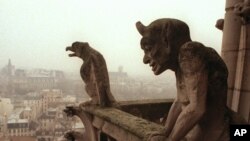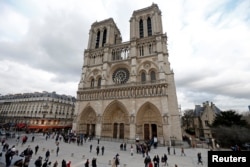The Archbishop of Paris is on a 100 million-euro ($120 million) fundraising drive to save the crumbling gargoyles and gothic arches of the storied Notre-Dame cathedral.
Every year, 12 million to 14 million people visit the 12th-century Parisian landmark on an island in the Seine river. Groundbreaking for the structure occurred in 1163 and construction was completed in 1345. Pollution and exposure to elements over time have resulted in losses of large chunks of stone.
"If we don't do these restoration works, we'll risk seeing parts of the exterior structure begin to fall. This is a very serious risk," said Michel Picaud, president of the Friends of Notre-Dame charity set up by the archbishop.
Church officials, who have created what they are calling a "stone cemetery" from fallen masonry, say the cathedral remains safe to visit.
Entry to the cathedral is free, and the French state, which owns the building, devotes 2 million euros a year to repairs.
But that is not enough to embark on major restoration works, the last of which were carried out during the 1800s, officials at the cathedral and charity said.
Hugo's book
Notre-Dame has long drawn tourists from around the world.
It is most famous in popular culture as the locale for 19th-century author Victor Hugo's "The Hunchback of Notre-Dame" and films of the same name, including the 1939 classic with Charles Laughton and the 1996 Disney musical animation.
The latter in particular raised the cathedral's profile for modern-day tourists from China to the United States.
"It's the movie for me. I just think of the Hunchback of Notre-Dame, and the book as well. After reading that book, I actually really wanted to come see it," said U.S tourist Claire Huber as she visited the cathedral.
Church authorities hope the cathedral's worldwide fame will attract donors, particularly from the United States.
"Gargoyles are what people want to see when they come to Paris. If there are no more gargoyles, what will they see?" Notre-Dame communications chief Andre Finot said.





